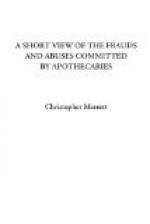censure and grumble at the actions of the States-men,
though their proceedings have been never so wise,
and prudent, and oft-times from muttering and whispering,
fall to down-right distast, and mutiny against their
Superiors. So that the good success, in State-affairs,
of rash and imprudent undertakers, have been extolled
and preferred before the wary, and prudent management,
and guidance of the soberest and wisest States-men.
The same likewise happens between the bold Empiric,
and learnedst Physician. But in this way of censuring,
the States-man hath this advantage above the Physician,
that ’tis possible he may meet with a series
of Business so circumstantiated, as seldom or never
to miscarry, especially having a greater power over
subordinate persons then Physicians have. But
the irreversible statute of Heaven forbids us to expect
a constant recovery of our Patients, for ’tis
appointed, that all men must die. ’Tis
sufficient therefore for us, to employ those remedies
God hath given to the Sons of men, to the utmost vertue
the Creator hath endowed them withal: since his
eternal decree hath limited their efficacy from making
man immortal. Now since (if men judg by the success
alone) it cannot be otherwise, but that the most learned
Physician, and most sottish Empiric must be thought
equal in skill, by those that are not able to make
a right judgment and difference betwixt them on other
principles. Hence it comes to pass, that where
some ignorant person hath cured accidentally a slight
disease, and a Physician hath a Patient dye of an irrecoverable
Case, here the Empiric shall be applauded, and the
Physician decryed. Nay many will say the disease
is the same in both, whereas we daily see most gross
mistakes in such opinions, when the Cases differ totally
in their Nature, agreeing in one sign only common
to both the Cases proposed, nay to many other also.
Furthermore, if a Patient dy under an Empirics hand,
the friends willingly conceal their Names, lest some
discredit should befal them for using such worthless
practisers; but if under the hands of a known Physician
he shall be sure to be named, and sometimes his attendance
falsly fathered on him, when Mountebanks only have
been employed: but to besure if an Empiric hath
first been made use of, and afterwards an able Physician
called in (when all opportunity of doing good was
past) and the Patient dy, the Mountebank hath never
been mentioned, but the Physician perhaps condemned
though he hath done whatsoever could have been thought
on, rational in that Case.
Add to the former reasons, the bold and confident
brags, and promises of Empirics, that they have cured
worse diseases, and will in few hours free them from
their maladies, especially where sober Physicians
have pronounced doubtfully of the event. No wonder
that these pleasing promises to persons in danger
and distress bring them into employment even with
a rejection of the former sober Physician.
Besides, a foolish opinion prevails with some ignorant
persons, that they will deal only with such as will
undertake the Cure, (that is) contract with them for
a sum of money, one half whereof to be payed in hand,
and the other the Cure being done, and so are usually
cheated of one half of their money; and such people
will have nothing to do with such Physicians as will
not undertake them in this sence.




